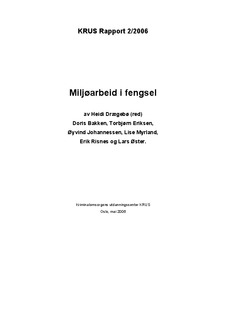Miljøarbeid i fengsel
Drægebø, Heidi; Bakken, Doris; Eriksen, Torbjørn; Johannessen, Øyvind; Myrland, Lise; Riisnes, Erik; Øster, Lars
Book
Permanent lenke
http://hdl.handle.net/11250/160564Utgivelsesdato
2006-05Metadata
Vis full innførselSamlinger
- KRUS - Publikasjoner [99]
Sammendrag
The work group proposes to regard 'milieu therapy' as a superior and
structuring entity, and thus something more than a supplement to the already
existing measures: The personal officer arrangement and the program
activity, to mention but a few, have a professional platform of their own at
the same time as they are to have a base within an entirety of milieu therapy,
so that the different measures taken draw in the same direction. It is stressed
that everyone in the units are given insight into what milieu therapy is and
how it shapes the day-today work in prison.
Milieu therapy in prison presupposes fellowship on the ward. Furthermore,
milieu therapy rests upon two main pillars – mutually dependent on each
other:
1) Explicit and returning structure and 2) credible relations. These pillars
form a predictable and preservative atmosphere necessary in enabling prison
to serve as a place of personal development and change. Finally, this report drafts out proposals for educational arrangements and
educative materiel. The educative model and the materiel should be adapted
to the variety of work-tasks and positions in prison. The educative materiel
for leaders is recommended to contain theory of milieu therapy and
management, while for leaders with ward responsibility, introduction to
mentoring and pedagogic are important. For prison officers however, it is
vital that the educative materiel is mainly centred on methods for practical
arrangements of educating. Central themes will be: understanding change as
process, practical arrangements of the educative environment through the
use of fellowship and individual adjustments, introduction to systematic
models for work processes and communication.
